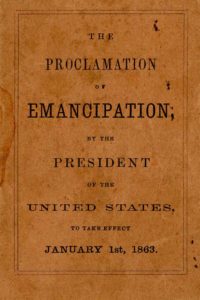
January 1: The Emancipation Proclamation

On January 1st, 1863—in the middle of the Civil War—President Abraham Lincoln issued the Emancipation Proclamation. This order declared that “all persons held as slaves” in those areas still in rebellion against the United States “shall be…forever free.” President Lincoln issued a preliminary proclamation after the Union’s September 1862 victory in the Battle of Antietam, and the official order was issued 100 days later. The Emancipation Proclamation did not apply to slaves in northern Union states and did not, in practice, free all slaves in the Confederate States. Still, it explicitly linked the northern states’ mission in the Civil War to the emancipation of slaves rather than just the preservation of the Union. In the Proclamation, Lincoln also allowed black men to join the Union army and navy, and by the end of the war in 1865, almost 200,000 black men had participated in the Union’s fight for freedom. The Emancipation Proclamation announced to the world that the United States was committed to the abolition of slavery. It also paved the way for future advances in civil rights, including the 13th, 14th, and 15th Amendments to the Constitution.




